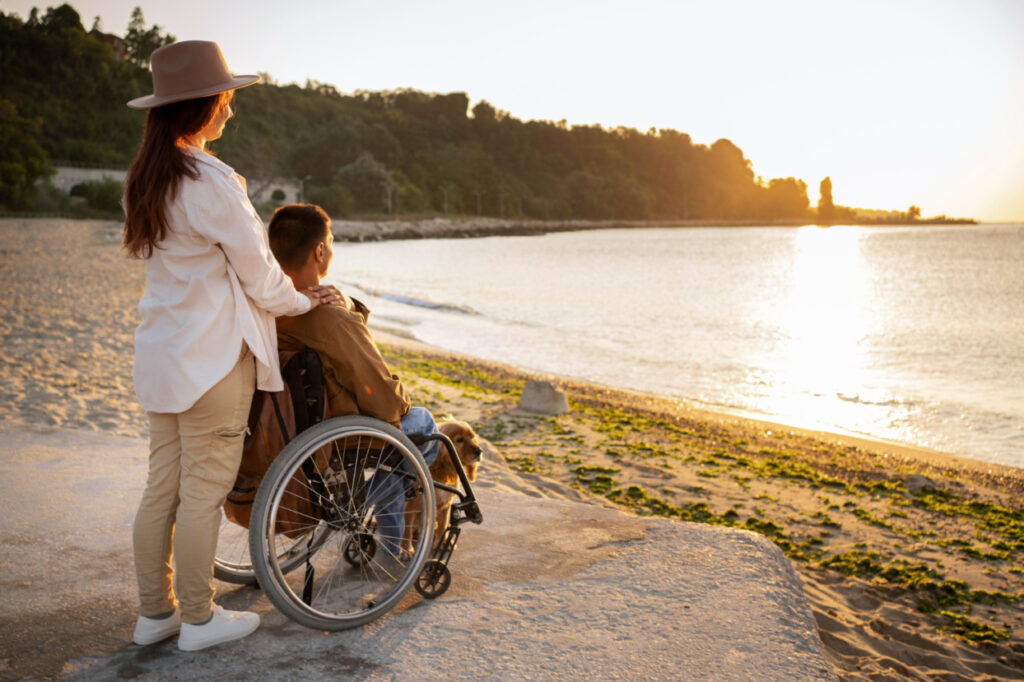Whoever you are, whatever you do, we all want to maintain our independence and manage daily tasks ourselves to the best of our ability. Whether you’re introverted or extroverted, everyone needs privacy and time to themselves which is one of the many reasons why maintaining one’s independence is essential for our mental health.
We all reach a time in our lives when we need a little extra help however it’s a common misconception that when certain tasks become difficult to manage by ourselves it means you’ll have to move into disability accommodation or a group home if you’re elderly. Its the goal of the Australian government to support your independence and help you stay at home for as long as possible which is why amazing initiatives like the NIDS and Commonwealth Aged care program have been developed. If you’re at a stage in your life where tasks like going to the bathroom or doing the laundry have recently become difficult but want to continue to maintain your independence from the comfort of your home, this is the blog for you.
What is in Home Care?
In-home care also known as respite is a broad term that can be used to describe any type of support you may need in order to live independently at home. This could be something like help getting in and out of the shower or help with the grocery shopping or cleaning the house by the respite carer. It could even be assistance getting to and from appointments. At the end of the day, the goal of any in-home care program is always the same: to help you live as independently as possible in the comfort of your own home.
What are the Different Types of In-Home Care Services?
Whether you were born with a disability, have recently been in a significant accident or simple daily tasks are becoming more difficult, there are many different types of in-home care services that are available to you. Regardless of what kind of support you need, it’s important to understand it’s ok to ask for help. The Australian government has a range of support networks available to those who need it.
Personal Care
Personal care is any type of assistance you may need with activities that are of what’s thought of as a personal or private nature. It will typically include tasks or activities you would only do yourself. The types of tasks that fall under the category of personal care include:
- Help to get in and out of bed
- Dressing
- Eating
- Personal hygiene
- Toileting
- Continence care
- Applying lotions or creams in personal areas
- Maintaining movement in your bed to prevent the occurrence of bedsores
- and more…
For most people, these activities are things we take for granted but for some, they can be quite difficult. When it comes to personal tasks, it can be extremely challenging and sometimes embarrassing to be in the right state of mind to ask for help. However, not asking for help when you need it can be detrimental to your mental health.
If you find you need help with any tasks that are of a personal nature, it’s important to remember that the NDIS and Commonwealth Aged Care program employs a range of talented Carers, Nurses and Allied Health Professionals that focused on providing the best possible care for you in the comfort of your own home with compassion, empathy and understanding. Asking for help with personal care is never something anyone should be embarrassed about.
Domestic Assistance
Domestic Assistance is any type of help you may need around the house. It can include things like:
- Vacuuming
- Dusting
- Mopping
- Washing the dishes
- Taking out the rubbish
- Laundry
- Ironing and more…
Much like personal care, these are tasks that we all take for granted but can become difficult as we age or if we develop a disability. If you find yourself struggling to keep on top of the housework, it’s important to reach out for help. The last thing you want is to be living in an environment that’s not clean and comfortable. It can be negative for your mental health and cause you to become socially withdrawn should you not feel comfortable having guests over to your home.
There are a range of domestic assistance services available through the NDIS and Commonwealth Aged Care program. These services can be tailored to your specific needs and can be scheduled as little or as often as you like. Perhaps you need a Carer or Nurse present throughout most of the day or you only need help for a couple of hours of the day or week. Whatever your needs, there’s likely an option that will be right for you.
Transport Assistance
Another common type of in-home care is transportation assistance. This can include help getting to and from appointments, social outings, or even just going for a walk around the block. If you’re finding it difficult to get out and about, there are a number of services that can assist you. These include:
- Accompanied transport
- Community transport
- Door-to-door transport
- Wheelchair accessible transport and more…
There’s no need to miss out on appointments or social activities just because you’re finding it difficult to get around. There are a number of services available that can help make getting out and about a lot easier.
Social Support
In-home care can also include social support. This can be anything from having someone to talk to, going on outings or even just having someone present in the home. If you’re feeling isolated or lonely, it’s important to seek assistance. There are a number of services that can provide social support including:
- Accompanied outings
- Community activities
- In-home visits
- Telephone support and more…
It’s essential for anyone to maintain social contact as it’s key to maintaining optimal mental health. There are a number of services available that can help you stay connected with the community.
Community Nursing
For some people, in-home care can also include community nursing. A community Nurse is a specially trained health care professional who is able to provide a range of services outside of a hospital setting. They’re experts in staying organised and keeping track of the individual needs of their clients. There is a range of tasks that are performed by Community Nurse including:
- Wound care
- Palliative care at home
- Medication management
- Pain management
- Providing care should you get sick
- Checking your blood pressure
- Injections and more…
All of these services can be tailored to your specific needs and can make a big difference to your quality of life.
A Leading In-Home Care Provider
Thanks for reading. It’s important to always remember that if any daily or personal tasks are becoming challenging, you’re not alone. There are support options available that can help you maintain your independence and stay at home for as long as possible.
At OSAN Ability, we’re an NDIS and Aged Care Provider that’s passionate about providing the best possible care for our clients. We offer a range of in-home care services that are designed to keep you at home for longer. Our team of highly trained and experienced professionals can develop a program, customised to your specific needs and designed to help you maintain your independence. If you have any questions or are unsure where to start, call us on 1300 799 941 to talk to one of our trained representatives 24 hours/day, 7 days/week.










